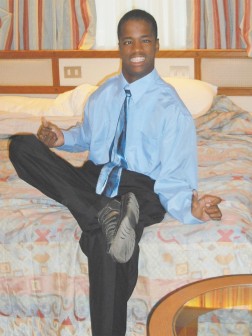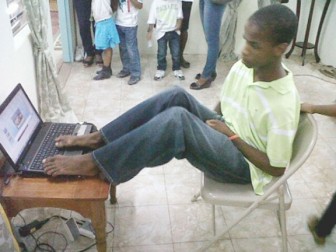For Norris Cummings, who was born with cerebral palsy and is without control of his upper limbs, life has been about adaptation.
“I use my feet to eat, text, hold the phone to my ears and even write in cursive,” he told Stabroek News.
At 22, the New Hope, East Bank Demerara resident is Chief Executive Officer of Foot Works Inc, which provides graphic designing, printing and photocopying services, creating business cards, brochures, certificates and flyers.
“I do it all by myself but I would ask someone [from the household] to read it over,” he said. He also does computer programming.
The doctors told Norris that his condition was caused due to a “delay at birth” and a “lack of oxygen.” He underwent physiotherapy from the age of six months to the age of three years, nine months. However, it took him 12 years before he finally started to walk.

Asked whether therapy had helped him to walk, he said it may have been a factor. “…But I would call it more a determination in me. I fell a couple of times and I got three or four buss head due to my determination but I never gave up,” he said.
“It [walking] happened after a continuous effort. I started in the house, walking from one chair to the other and as I got better I went out in the yard. I felt happy when my feet started to get stronger and my balance got better,” he added.
Although he has adapted to his disability, Norris continues to face challenge. His head shakes uncontrollably as he speaks and he gets “a lot of stares from persons and some of the disgusting ones would say a couple of words like ‘how you look so drunk’ or ‘how you look so bruk-up’ and some even say ‘put your head straight.’”
He is often hurt by such comments “but sometimes I would just smile and walk away. You have to understand that they are what you call illiterate. I try not to let them get my attention because at the end of the day I still have to go about my business.”
Norris travels on his own most of the time, probably to attend meetings or to just “buss a lime… you gah to catch up on the lil walk,” he chuckles.
He has a lot of friends and sometimes “I would tell them to let us go take a walk somewhere and if they have the time they would come.”
Also, like most persons with disabilities, Norris said “transportation is one of the biggest problems” he faces. “Some of the buses would just pass me straight and don’t pick me up at all. Only a few drivers who know me would actually take the time to stop for me.”
It is a situation he is working to change.
Recently, he attracted a lot of attention when he showcased his talents at the last GuyExpo. “Persons were amazed that I can do so many things with my feet. They never saw anything like that at GuyExpo before,” Norris beamed.

He was part of the National Commission on Disability’s booth, which exhibited a house complete with wheelchair ramps, kitchen, living room and washroom facilities.
Norris said members “were trying to show people that they can make their houses accessible for people with disability and that disabled persons can get along with their normal life.”
Support
He was also part of a team that visited the New Amsterdam Special Needs School recently for the launch of the Berbice Young Voices group. Young Voices, he explained was funded by the European Union and serves as an advocacy group for persons with severe disability and works mostly with inmates from the Cheshire Home at Mahaica.
He said persons from the home “require a lot of attention” and that “families don’t have the time to take care of them so staff has to do everything for them.” He said Young Voices “is their voice because they cannot advocate and say what they want.”
Young Voices also provides an opportunity for young persons with disabilities in developing countries to empower themselves. It also helps to change the way disability is viewed.
It began as a project of the Leonard Cheshire Disability Global Alliance in 2006.
The witty youth jokingly told this newspaper that he is “just an ordinary member [of Young Voices] because I don’t like position; I like to be a free agent.”
Norris was a student of the Diamond Special Needs School, which provides primary education from ages four to 16. He then attended the Open Door Centre for a year and a half and obtained a certificate in Information Technology.
His skills as a graphic designer were achieved through a scholarship programme that he participated in at Global Technology, through funding from former Miss Guyana World Olive Gopaul. He recalled that one of his friends had informed Gopaul about his use of his feet and she visited him. He established his business after he obtained his certificate upon completion of the course last year.
Exposure
The last of four siblings, Norris said he gets a lot of support from his family. He singled out his mother, Yvonne Cummings, for her love, care, attention and commitment to him and said “she deserves lots of gold medals.”
He advised persons that they “need to show people with disability a lot respect and stop making fun of them because at the end of the day you don’t know what your future holds.”
Norris also encourages parents who have children that suffer from disabilities to not hide them away from the world. “It is not the end of the world; don’t be ashamed and lock them away… I am sure that a lot of persons with disability are locked away,” he said.
He was happy that his mother did an “excellent” job of giving him exposure and “not locking me away. I think that made me more intelligent. When you go out there you learn a lot. Exposure is good; you gain a lot of experience.”
Norris knows that surgery can help his condition to some extent. But he also knows – from research on the internet – that there are a lot of “risks” involved.
He nevertheless would have loved to give the surgery a try. “If I had the money and get the right doctors to do it but I am low on finance,” he said.
In the meantime, he thinks there is a divine purpose to his circumstance. “There is a reason for me being like this because God wants me to show other people what I can do and no matter what the situation is they could always conquer it.”
He hopes that his story “can inspire others to achieve success and that it can change the way the society looks at people with disability.”




